Herbert Ransom (1885 – 1928) was a wood machinist working at Gordon & Co, Bradford Street, Birmingham in the 1921 census.
Most of the information on the Gordon family below is taken from a collection donated to Manchester Libraries, Information and Archive by Mrs. L. Albury who was the granddaughter of Jonas Gordon – who ran Gordon & Co. of Bradford Street, Birmingham.
Jonas Gordon (1852-1936) was born at Tettenhall. At the age of 13 he went to live with his uncle who kept a drapery store in Texas. Jones Gordon earned his living in the watch trade at one time.
In 1876 he established a furniture manufacturing business in Albion Street, Birmingham and later premises were taken in Bradford Street. The business came to employ 500 workers.
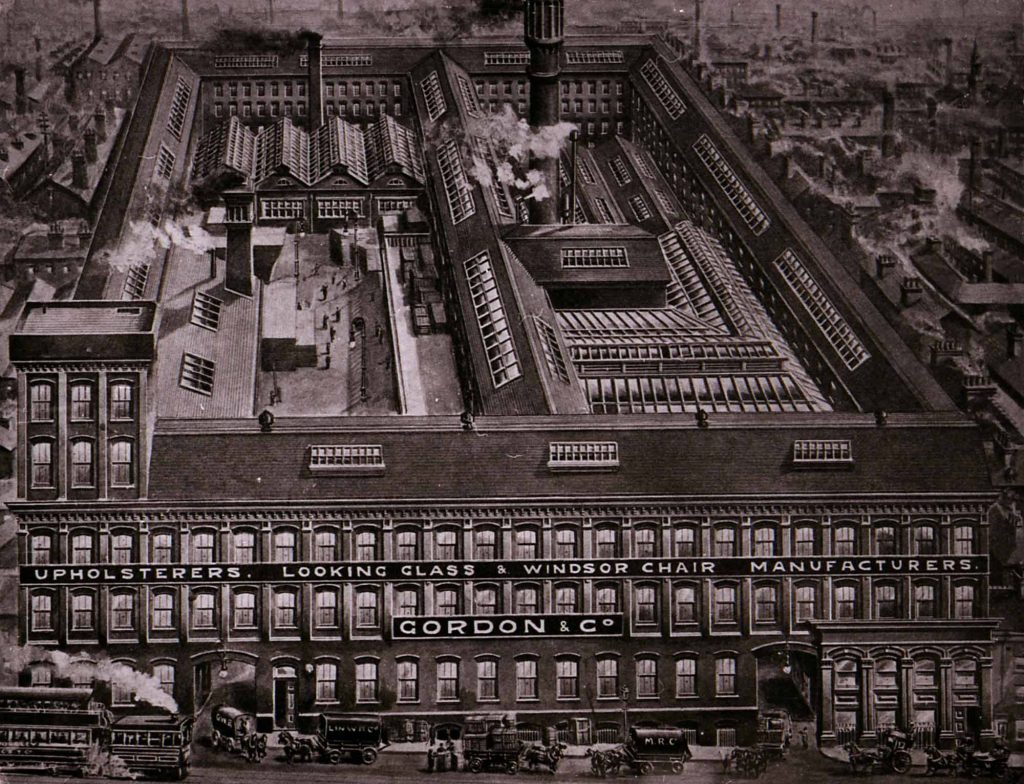
Held by: Manchester Libraries, Information and Archives
Identifier: GB124.DPA/3018/26
reference: 3018
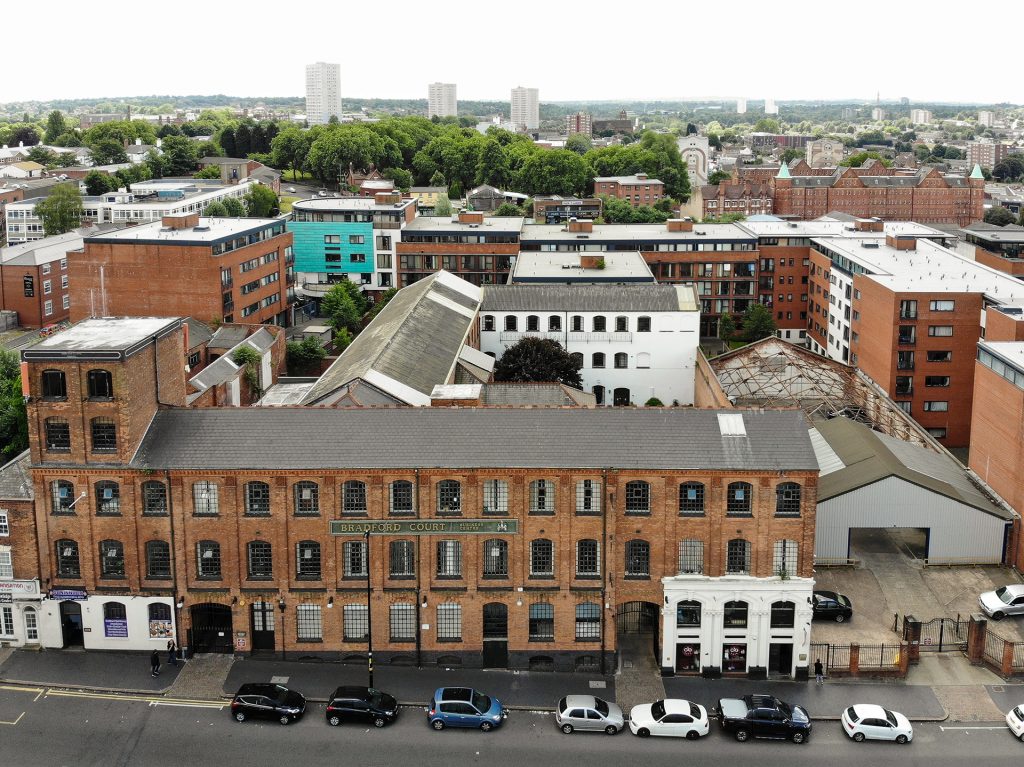
Gordon & Co apparently started as Furniture makers, which is probably not surprising as early car bodies were often wooden based. Below are the entries from Kelly’s Directory. Remembering that the directory date is probably up to a year before publication date, the car business probably ran from 1914 . The furniture business continued.
- 1892 Gordon & Co. furniture manufacturers, 123 Bradford street
- 1892-1895 Gordon & Co. furniture manufacturers, 123 Bradford street
- 1896-1897 Gordon & Co. furniture & looking glass manufacturers and upholsterers, 123 to 131 Bradford street
- 1899-1903 Gordon & Co. furniture, looking glass and windsor chair manufacturers and upholsterers, 123 to 131 Bradford street
- 1904-1908 Gordon & Co. furniture manufacturers, 123 to 131 Bradford street & Floodgate St
- 1910-1913 Gordon & Co. furniture manufacturers, 123 to 131 Bradford street
- 1915-1940 Gordon & Co. furniture manufacturers, 123 to 131 Bradford street & motor car body bldrs.Taunton rd.Balsall.hth.
- 1943 Gordon & Co. furniture manufacturers, 123 to 131 Bradford St
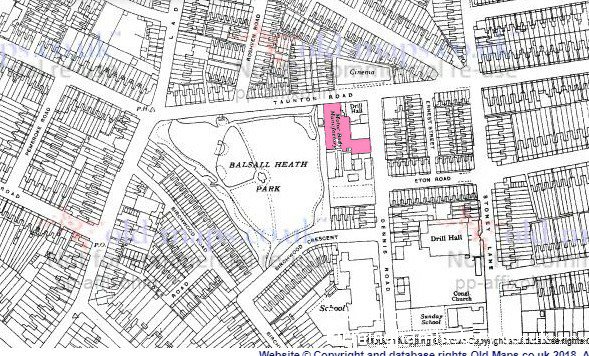
A Windsor chair stamped GORDON & CO. BIRMINGHAM is illustrated in Boram, Regional Furniture (1995), fig. 6. However, it is possible that this is a High Wycombe chair retailed by Gordon & Co.
“A version of the lath-back Windsor chair (Fig. 5) has recently been found, stamped GORDON 6c CO. BIRMINGHAM (Fig. 6). The chair is made with a plain elm seat in conjunction with beech and ash parts. The only reference to this Company, in trade directories, is in 1899. Gordon and Co. of Bradford Street, Birmingham are described in Kelly’s directory as Wholesale Cabinet Makers and Upholsterers. However the likely maker of this chair is James Cox and Sons (1864-1907) whose chair manufacturing works was in Oxford Road, High Wycombe. B. D. Cotton has recorded an identical chair name stamped JS. COX, HIGH WYCOMBE, BUCKS.® It is of further interest that the components for some of the Windsor chairs, assembled by James Cox 6c Co. in the early 20th century, were supplied by workshops in Beacons Bottom, Stokenchurch. The reference to the wholesale activities of Gordon and Co. suggests that the chair was made elsewhere and reinforces our knowledge of the widespread nature of the trading networks radiating from the Chiltern workshops. This substantiates evidence that wholesalers or furniture brokers felt free to name stamp chairs in the same way as many chairmakers. Name stamping was no doubt perceived as an integral aspect of advertising and marketing.”
THE TRADING NETWORKS OF THE CHILTERN
CHAIRMAKERS by John Boram
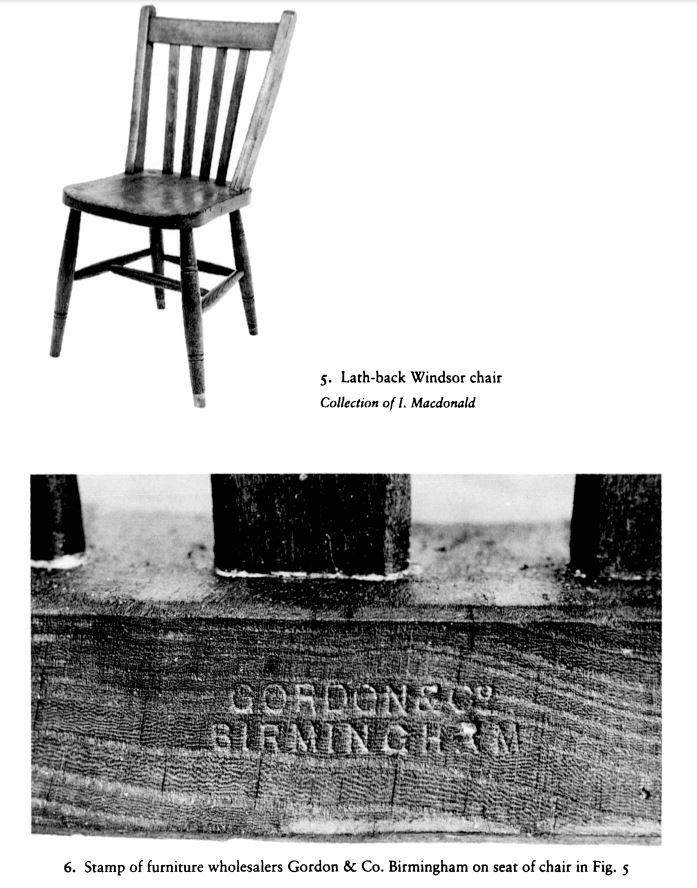
CHAIRMAKERS by John Boram
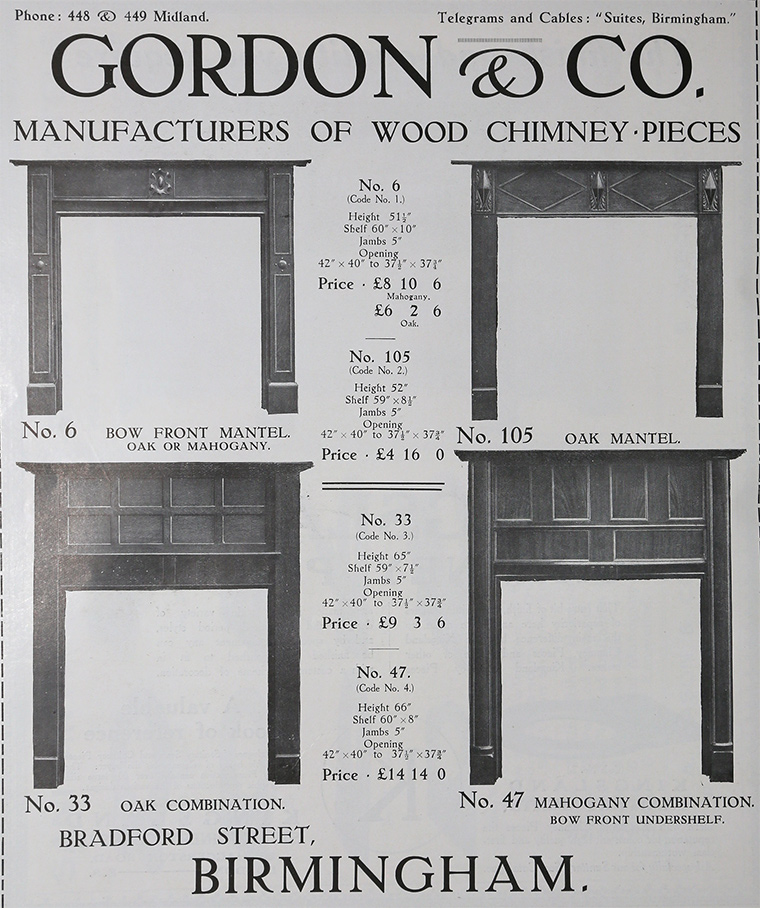
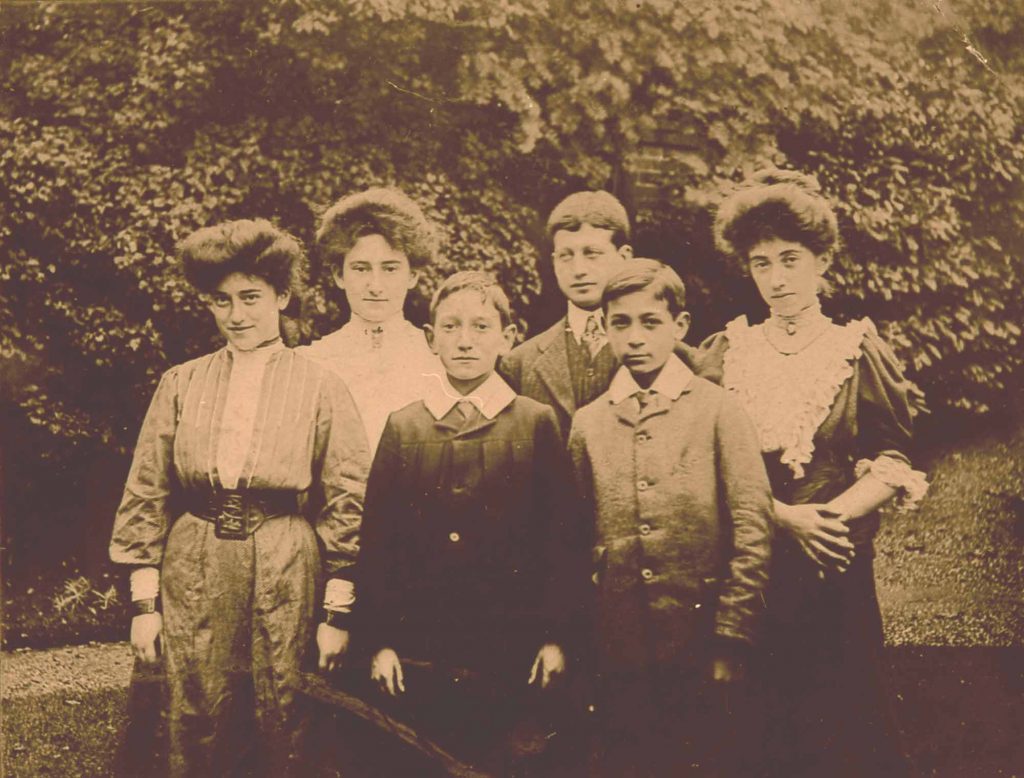
Held by: Manchester Libraries, Information and Archives
Identifier: GB124.DPA/3018/8
reference: 3018
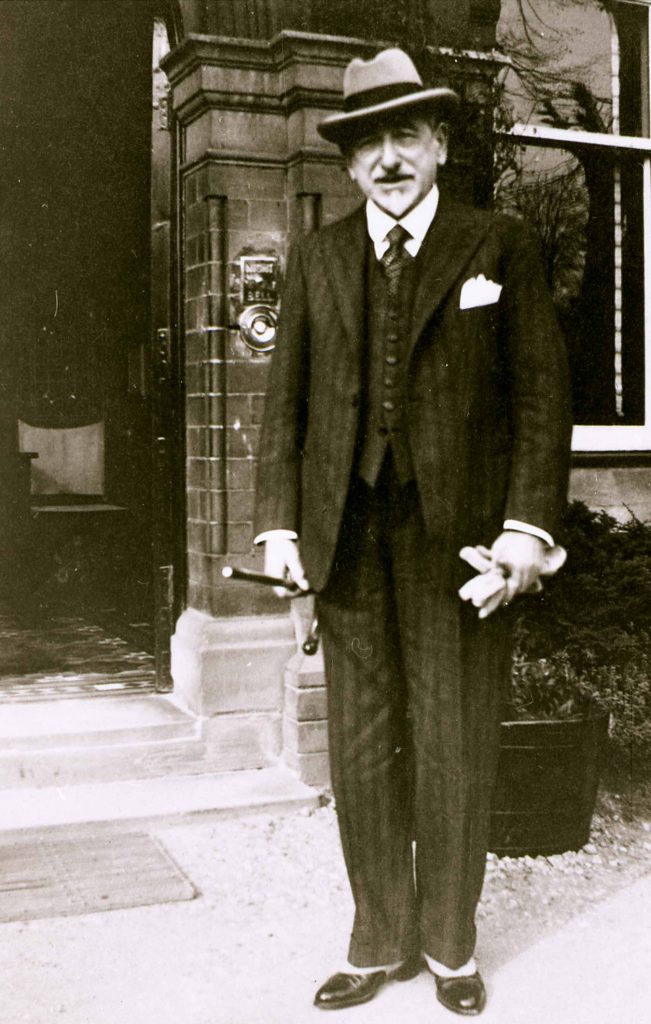
Held by: Manchester Libraries, Information and Archives
Identifier: GB124.DPA/3018/27
reference: 3018


The Gordon’s were a well connected family and other related Gordon’s also had furniture business’s in Birmingham as did some of the families they were inter-married with:
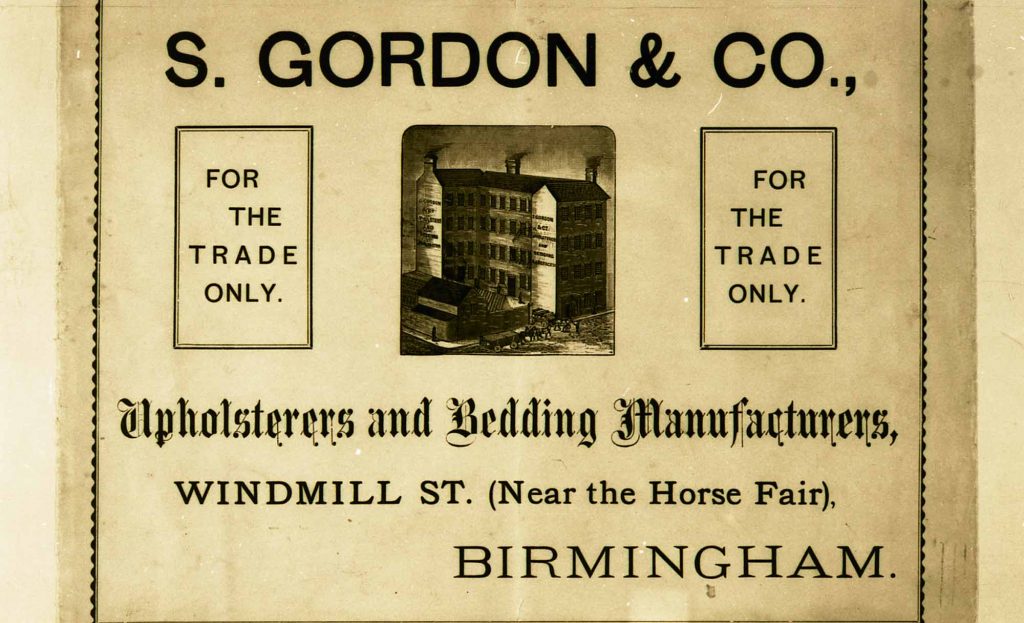
S. Gordon was a close relation of the Gordon who own Gordon & Co. The person who donated this photo to the Manchester Archives was the grand daughter of Jonas Gordon of Gordon & Co and the niece of S Gordon of S. Gordon & Co.
Held by: Manchester Libraries, Information and Archives
Identifier: GB124.DPA/3018/28a
reference: 3018
The following taken from Manchester Libraries, Information & Archive. reference 3018, Author – Albury, L, Mrs, fl 1982, of Birmingham:
Jonas’s brother Sam, was also involved in the Birmingham furniture industry but in sales rather than manufacture. Sam’s wife Esther (nee Caro) came from Norwich. Their daughter Violet (ded 5 years ago in her late 80s) was active in the St. John’s Ambulance Service. Sam Gordon and family lived in Priory Road, Birmingham.
Jonas Gordon had 2 sisters: Leah and Rachel. Leah married Barney Goodman, owner of several furniture shops; they lived in Augustus Road.
Some interesting Birmingham history related to the Rachel Gordon (later Mindelsohn) branch of the Gordon tree:
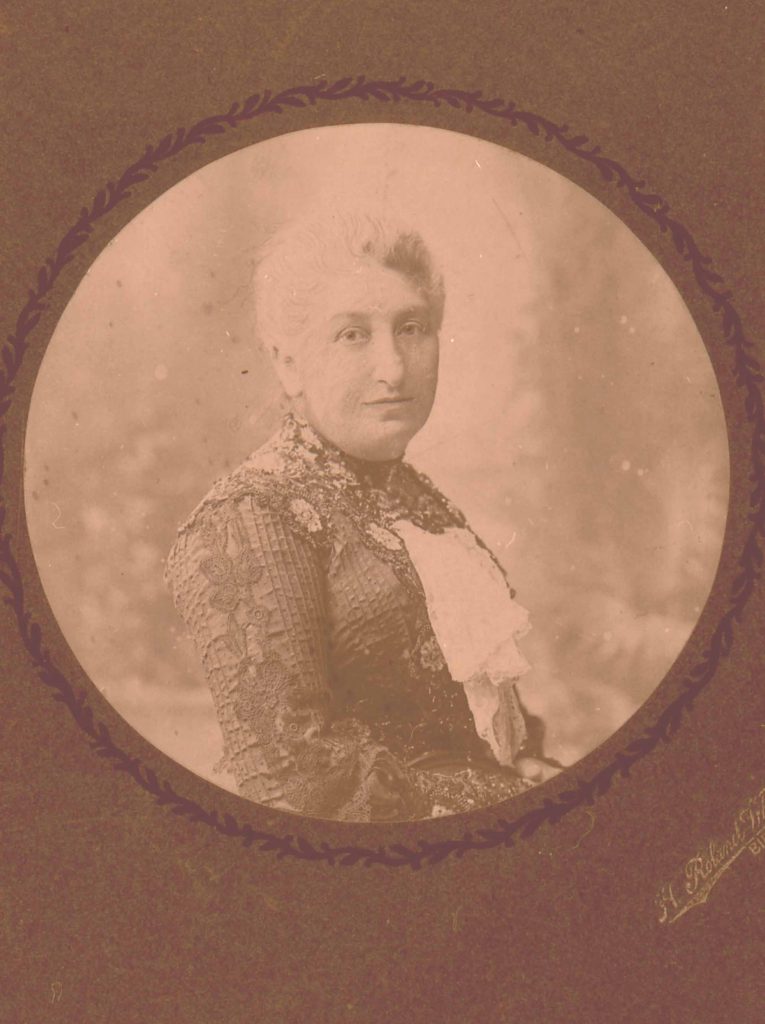
Held by: Manchester Libraries, Information and Archives
Identifier: GB124.DPA/3018/12
reference: 3018
Rachel married Meyer Mindelsohn, a Birmingham furniture dealer. They had a son, Moss, born c.1870s. He also went into the furniture business and the wholesale grocery trade too. Moss lived in Carrisbrook Road, Birmingham. They had another son Mendel Gordon Mindelsohn who married Esther. Mendel and Esther had a son called Keith Mindelsohn. Keith married Joan. Keith owned the chain of corner shops called Wrenson’s and between them Keith and Joan started the Keith and Joan Mindelsohn Charitable Trust managed by solicitor Richard Jaffa. Mindelsohn Way at the Queen Elizabeth Hospital at Selly Oak/ University, Birmingham named is named after them. Here is an interesting piece on money they donated:
A pounds 3m legacy of love; Widow’s gift after lifetime of service.
A Birmingham widow who lived her last years as a virtual recluse has left pounds 3million to charity.
1998 Birmingham Post & Mail Ltd
The remarkable legacy is the last act of Mrs Joan Mindelsohn who spent a lifetime in service to the city.
Out of an estate valued at pounds 4.7million Mrs Mindelsohn has set aside pounds 1million to create a trust fund in her name to help generations of the city’s needy and Birmingham societies connected to the arts and education.
She has also given pounds 2million to the Friends of the Queen Elizabeth Hospital, the Royal National Lifeboat Institution, the Birmingham Jewish Welfare Board and a local masonic group – each receiving pounds 500,000.
Mrs Mindelsohn died childless in March, aged 86.
Last night she was praised for her generosity in giving away the money built up by her husband Keith who established the famous corner shop Wrensons in the city.
In its heyday, Wrensons – with its slogan “the best bacon in Birmingham” – had more than 250 shops across the city.
Executors of the will are still deciding what type of charities they will help as part of the Keith and Joan Mindelsohn Charitable Trust.
Solicitor Mr Richard Jaffa said the types of groups would include those helping to improve the standard of living for the elderly – particularly in medical research.
But Mr Jaffa added that groups with any connection with the city – where Mrs Mindelsohn lived for more than 60 years – may be considered for financial help.
He said the pounds 1million would be invested and the interest from the capital used to finance good causes so the benefit would last for ever.
The generosity follows a lifetime of quiet service to the city by the Mindelsohn family.
Mrs Mindelsohn’s father-in-law, Mendel, helped to set-up and build the Queen Elizabeth Hospital in Edgbaston in the 1930s, becoming chairman of the board of governors.
Mr Keith Mindelsohn followed in his father’s footsteps, becoming chairman of the hospital house committee – the management team at the hospital.
The family firm, based in Lower Essex Street, was sold off in 1972 and later became part of the David Greig supermarket chain.
Mrs Mindelsohn was left a widow in 1983 when her husband died aged 75. She is survived by a sister Mrs Mary Bloch who now lives in Johannesburg.
Mrs Bloch and her family will share the bulk of the remaining pounds 1.7million from the estate with the residue going to friends of Mrs Mindelsohn. During her life Mrs Mindelsohn helped raise money for the benevolent committee of the Queen Elizabeth Hos pital which was used to buy furnishings for day rooms and baby clothes for the maternity unit.
Last night Mrs Wendy Marks, treasurer of the hospital friends’ group, said: “We’re extremely grateful, with the money we can do so much more than we had been able to do. “
Mrs Mindelsohn also helped the Jewish community donating thousands to help build nearly 30 sheltered homes in Rake Way, Birmingham, and construct Andrew Cohen House, a home for nearly 60 elderly people in Stirchley.
Mr Jaffa, a former president of the Birmingham Jewish Welfare Board, said: “The gift secures the future of the charity for the next 30 years.” Mrs Mindelsohn and her husband were also boating enthusiasts and enjoyed cruising on the River Severn.
Their hobby led Mrs Mindelsohn to become involved in raising money for the RNLI, becoming a committee member of the Edgbaston and Harborne Ladies Lifeboat Guild.
Mrs Ann Williams, regional manager of the RNLI, said the pounds 500,000 would be used to create a permanent reminder of Mrs Mindelsohn.
“This will be used for a large piece of expenditure like buying a boat or building a station so that her memory lives on,” she said.
The executors have yet to decide which masonic group will benefit. Mr Mindelsohn had been Grand Officer of the St Paul’s Lodge in Birmingham.
Youngsters’ trip behind the mast.
The generosity of a Birmingham widow will give four teenagers from a deprived inner city estate the chance to sail the high seas.
2001 Birmingham Post & Mail Ltd
A pounds 2,000 grant from the Joan Mindelsohn Trust will help the teenagers from the Castle Vale estate take a two-week voyage aboard the 195ft sailing ship the Stavros S Niarchos.
The latest grants issued from the trust, set up following the widow’s death in March 1998, will help hundreds of youngsters across the city.
The sailing grant, in addition to pounds 2,000 from the Castle Vale Community Fund, will pay for the four, accompanied by a youth worker, to join a crew of 60 aboard the ship.
‘This will be a life-enhancing and character building experience for the teenagers, some of whom have never been away from home,’ said Richard Jaffa, who manages the Mindelsohn fund.
The trust was set up with part of a pounds 3 million legacy left to the city by Mrs Mindelsohn – the widow of Birmingham shop owner Keith Mindelsohn.
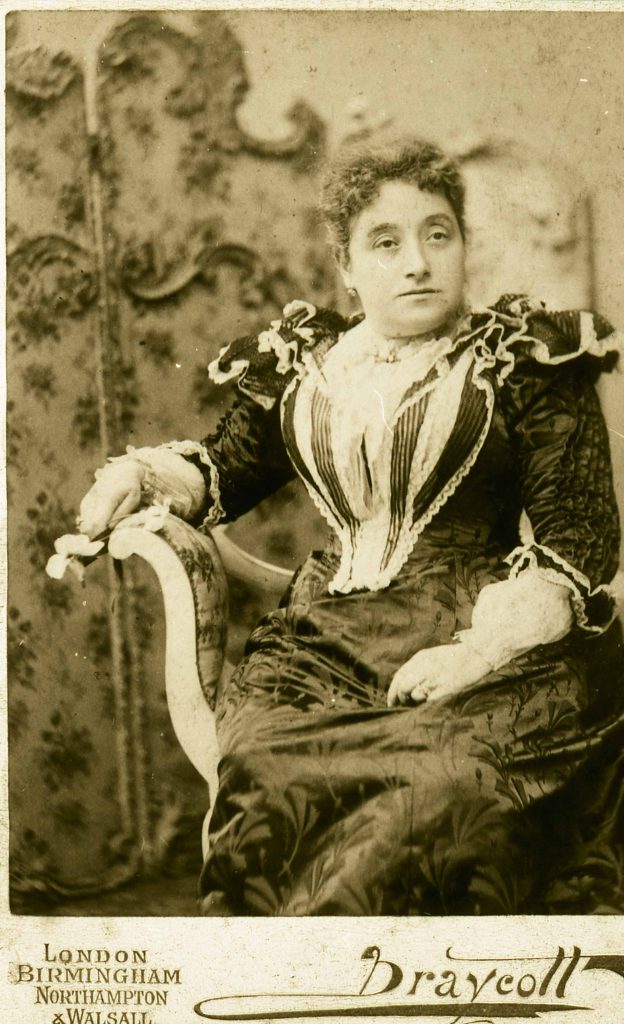
Held by: Manchester Libraries, Information and Archives
Identifier: GB124.DPA/3018/10
reference: 3018
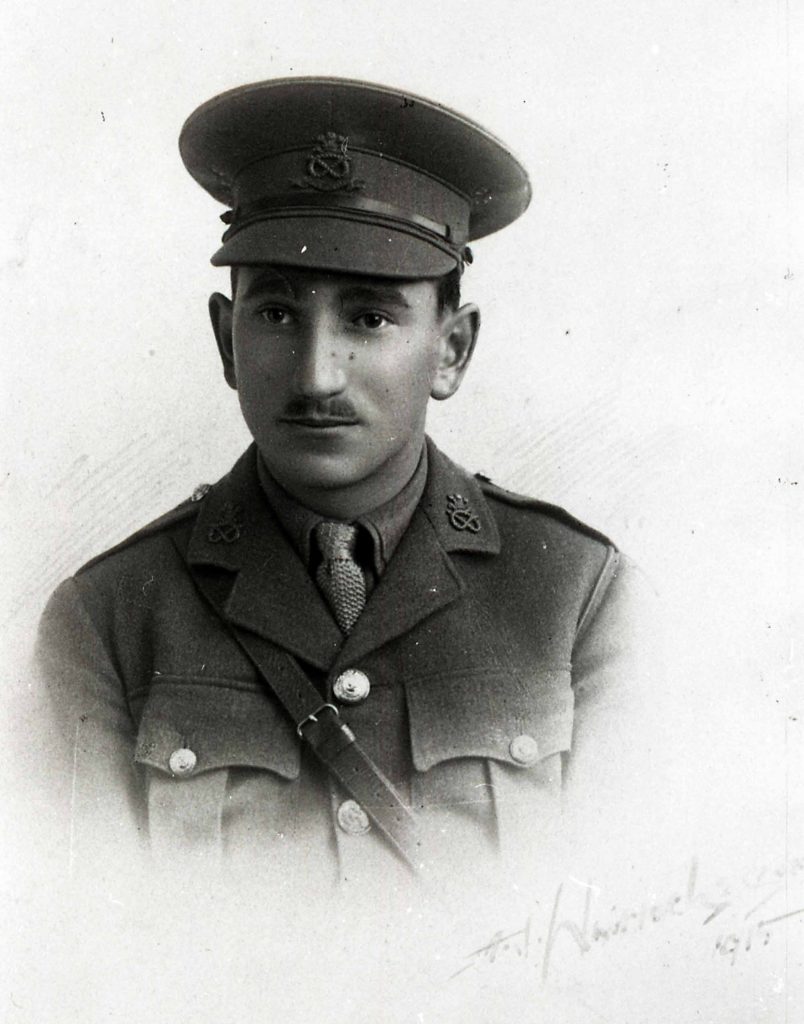
Held by: Manchester Libraries, Information and Archives
Identifier: GB124.DPA/3018/13
reference: 3018
Mrs. L. Albury’s father, Cyril Jonas Gordon (1892-1952) was the youngest child of Jonas and Rebecca Gordon; he was born at the family’s home in Bristol Road, Birmingham. He took charge of the furniture business established by his father. The other children of Jonas and Rebecca Gordon were:-
Miriam (the eldest) born c.1882.
Bessy Gordon died 3/4 years ago aged 93. She didn’t marry but stayed at home to look after her father.
Sally Gordon married Louis Levy, a Hull wholesale grocer.
There were 3 other sisters, making 6 in all.
Mrs. L. Albury’s maternal grandfather, Victor Bloch (died 1935 aged c.78) was in the wholesale jewellery business. He lived at 35, Portland Road, before his marriage and afterwards at Beaufort Road, Birmingham.
Mrs. Victor Bloch was brought to England at the age of 10 by her uncle, Abraham Danziger, a Clerkenwell jeweller.
Mrs. L. Albury’s husband is the grandson of Baillie Michael Simons (died 1928, aged c.80) a Glasgow fruit importer. Michael Simons lived at 2, Kensington Gate, Glasgow. He was a founder of Garnethill Synagogue (1879) and involved in a great deal of other civic work. He became a Lord Lieutenant of the county and he was a friend of the Prime Minister, Lord Rosebury.
Michael Simons wife, Rose (nee Moses) came from Tasmania.
Mrs. L. Albury’s mother-in-law, Rebecca Albury (nee Simons) was born in Glasgow in 1879 and married at 2, Kensington Gate in 1898. Her husband, Mr. Albury was in the jewellery and silver plate manufacturing business. The business was established in Albion Street, Birmingham in 1876 by Isaac Ahronsberg (donor’s husband’s grandfather) who had come to England from Russia in 1830. He settled initially in Southsea where he was in the jewellery and optics trade.
Isaac Ahronsberg married Juliet Lyon, daughter of a Plymouth watchmaker. The Lyon family came to Plymouth from Spain via Holland and they brought the Ark of their Synagogue with them.
Mrs. L. Albury’s father-in-law had a brother Albert (died aged c.74 in 1944) who lived at 46, Portland Road, Birmingham. He was a part-time soldier during World War I. By occupation he was involved in the family jewellery business.
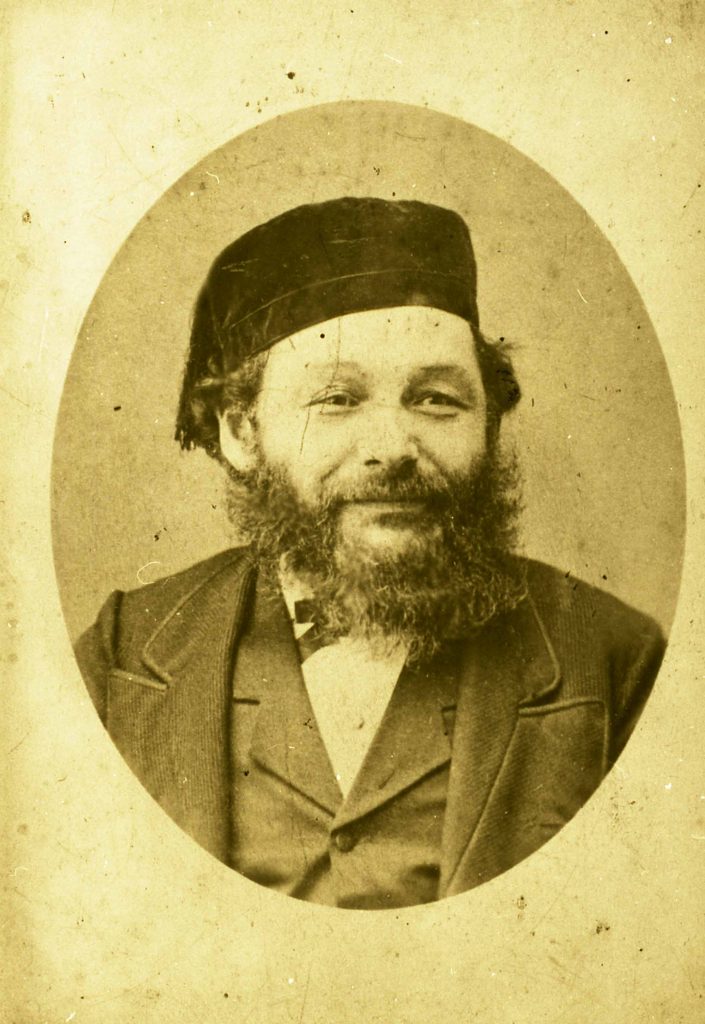
Held by: Manchester Libraries, Information and Archives
Identifier: GB124.DPA/3018/9
reference: 3018
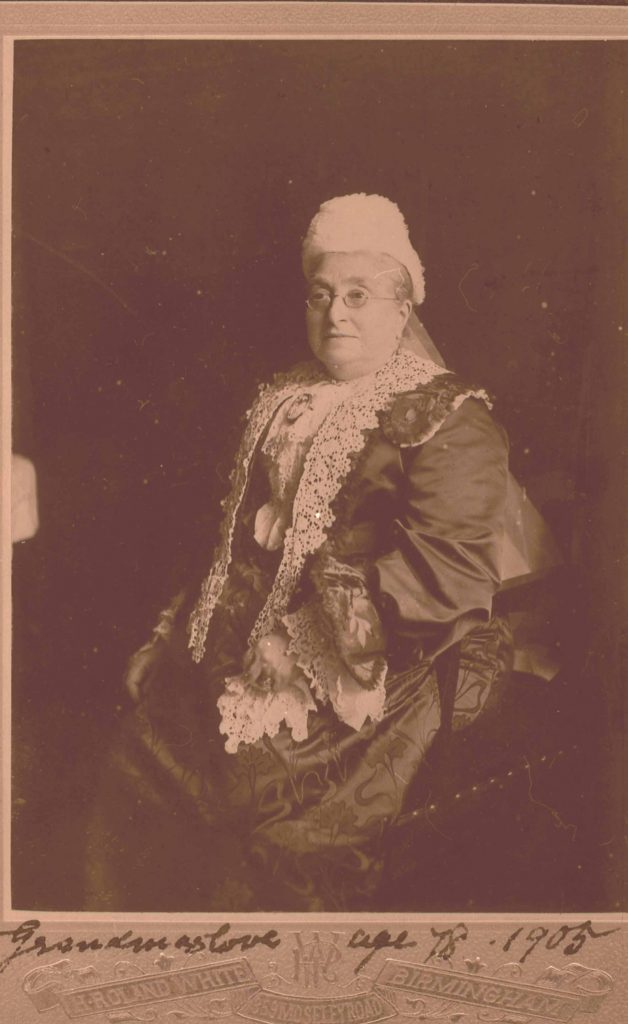
Jonas Gordon’s mother.
Held by: Manchester Libraries, Information and Archives
Identifier: GB124.DPA/3018/5
reference: 3018
